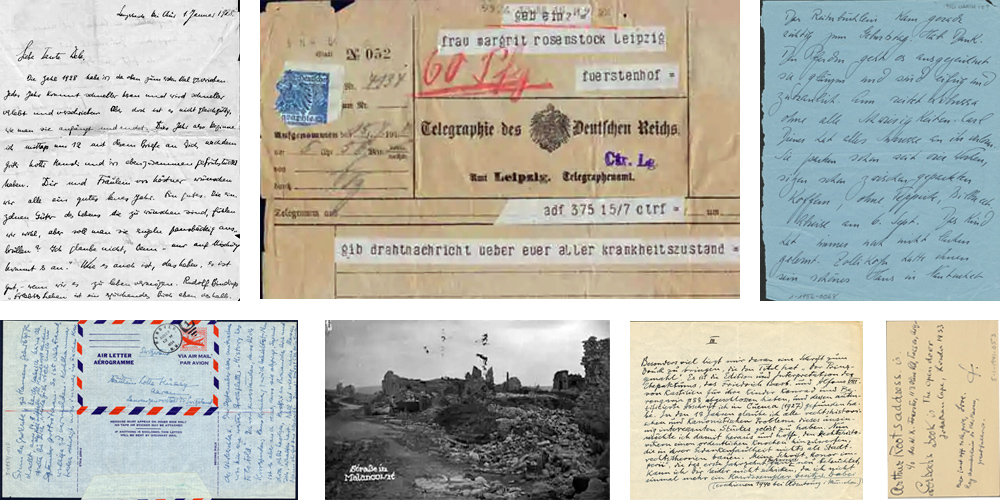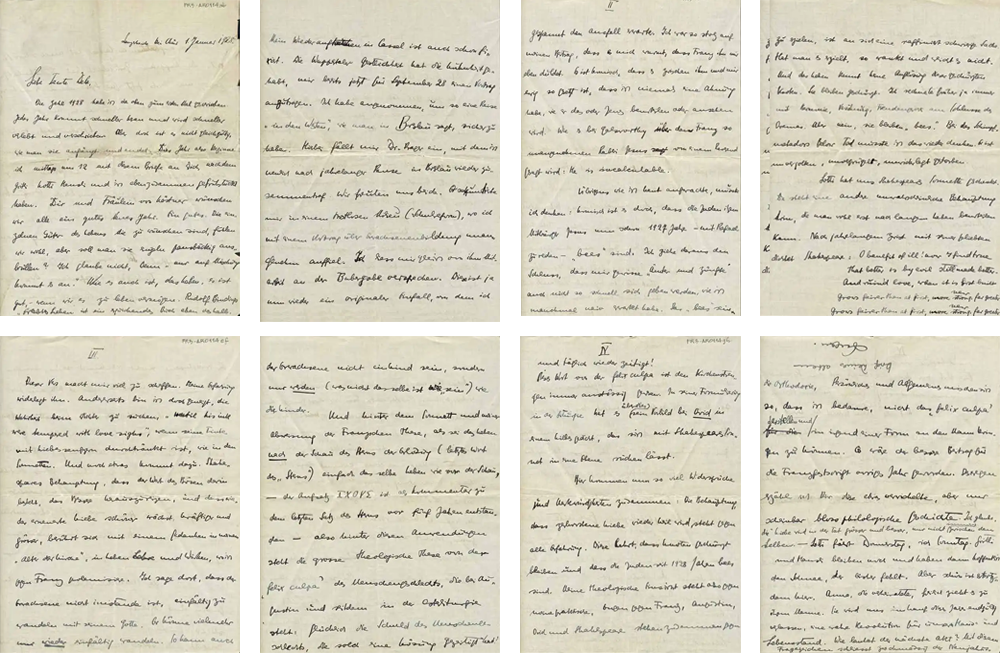The Eugen Rosenstock-Huessy
Digital Archive

The Digital Archive is a collection of some 55,000 page-scans of letters and other documents pertaining to the life and work of Eugen Rosenstock-Huessy and his wife, Margrit. The Digital Archive contains images of the “unique historical documents” donated to the Rosenstock-Huessy Archive at Dartmouth’s Rauner Library, as well as images of letters from other sources present only in photocopy, which are not available in the Archive at Rauner.
The Eugen Rosenstock-Huessy Fund dedicates the Eugen Rosenstock-Huessy Digital Archive
and its use to the Fund’s long-time president,and the prime mover behind the collection
of all the documents not included in the gift to Rauner Library:
Freya von Moltke.

The Digital Archive is organized in series and subseries, first by correspondent and then by date, and includes a page-level searchable spreadsheet listing of documents, allowing search for author and date, as well as by place of origin and destination of all letters, where that information is known. Where connections to other documents are known, they are given in notes within the spreadsheet. (Scholars are urged to notify the Fund of any errors or discrepancies found in the Digital Archive’s series spreadsheets.)
The bulk of the Digital Archive is made up of letters to and from family members, friends, and colleagues. It includes letters to and from many members of the Rosenstock and Huessy families as well as the Ehrenberg and Rosenzweig families (and several thousand pages of letters and documents from the estate of Cynthia Oudejans-Harris). Letters are organized by the correspondent’s last name; where several family members corresponded with the Rosenstock-Huessys, the named series contains letters from all the members of that family, collated chronologically. Letters both to and from the Rosenstock-Huessys are collected within each named series.
Altogether, the Digital Archive contains over 15,000 pages of letters from and documents by Eugen and over 5,000 pages of letters from Margrit Rosenstock-Huessy. Series 1 alone, the correspondence between Eugen and Margrit Rosenstock-Huessy spanning the years from 1914 to 1959, contains over 10,000 pages. Other correspondence series contain over 1,500 pages of letters from Henry and Rosalind Greene; over 1,200 pages of letters from Margrit’s sister Lotti Hüssy; and about 1,000 pages of letters from Cynthia Oudejans Harris. Series 13 (“Correspondence A-Z”) contains correspondences with over 450 people totaling over 12,000 pages; Series 18, correspondence and material relating to Camp William James, includes correspondence with over 150 people totaling over 4,000 pages, as well as some twenty essays by Eugen Rosenstock-Huessy. Subsequent series contain documents of a biographical or autobiographical nature; documents relating to Rosenstock-Huessy’s life and work; poems, sermons, and essays; and condolence letters on the death of the Rosenstock-Huessys.
The Digital Archive does not contain either the many boxes of Eugen Rosenstock-Huessy’s manuscript files nor the so-called “Gritli Letters,” written by Franz Rosenzweig to Margrit (and Eugen) Rosenstock-Huessy; these materials may be consulted at Dartmouth’s Rauner Library. (The only complete and uncensored transcriptions of the “Gritli Letters” may be found here on the Fund’s website.) It also does not contain the letters exchanged by Freya von Moltke with Eugen and Margrit Rosenstock-Huessy, which have been deposited at the German Literary Archive in Marbach along with the rest of the von Moltke family letters.
Copies of the Digital Archive have been donated to the German Literary Archive in Marbach and the archive of the Landeskirche Westfalen in Bielefeld as well as to Dartmouth’s Rauner Library. More recently, copies have been deposited at Northwestern University and the University of Michigan.

To broaden availability of the Digital Archive, the Eugen Rosenstock-Huessy Fund invites other institutions to request a copy of the Digital Archive, on certain conditions:
- Access to and use of the content of the Digital Archive is open to all authorized users, here understood to include people currently associated with the institution, such as (but not restricted to) faculty, staff, and students, as well as other researchers using the Library’s resources. Users agree to use these electronic resources for individual, noncommercial use only. Users agree not to systematically download, distribute to others, or retain for personal use, substantial portions of the Digital Archive; or to copy or print out substantial portions of any given correspondence.
- Users recognize that the Fund does not hold copyright to any of the contents of the Digital Archive. Publication of any and all material written by Eugen, Margrit, or Hans Huessy; by Ellen West Huessy or Mariot Gardner Huessy; or by any of their children; is contingent upon permission from the Rosenstock-Huessy Literary Heirs, who may be contacted here. Publication of any material by people other than members of the Rosenstock-Huessy or Huessy families must be sought from the current holders of copyright.
- Depending on the circumstances of the institutional request for a copy of the Digital Archive, the Fund may restrict its use to a particular department, school, or campus, even if the institution provides access to the general public in some locations. Infringement of these basic conditions may prompt the Fund to request return of the Digital Archive. The Fund makes the Digital Archive available to research institutions, not to individuals.
Institutions interested in hosting the Digital Archive should apply to the Fund here. Institutions willing to mount the Digital Archive on their own servers may request a “loaner” drive containing the Digital Archive to be copied and returned. Institutions unable or unwilling to host the Digital Archive on their own servers may request a pair of hard-drives containing the Digital Archive; the drives will be sent upon receipt of a check or transfer in the amount of $250 to cover the cost of the drives, copying, shipping and handling within the United States. The charge to institutions in other countries is $300.
![]()
Acting for the Rosenstock-Huessys’ legal heirs, the Eugen Rosenstock-Huessy Literary Heirs have decided to waive copyright in all letters, documents, and work, both published and unpublished, by Eugen and Margrit Rosenstock-Huessy. Authors and scholars are free to cite, quote, translate, and publish any and all letters, documents, and work by either Eugen or Margrit Rosenstock-Huessy. The Literary Heirs and the Huessy family request only that this freedom be exercised with fairness and decency.
The work of others, where it is included in works in which copyright has been waived, is unaffected by the Literary Heirs’ decision; permission to cite, quote, translate, and publish that work must still be sought from the current holders of copyright.
![]()
